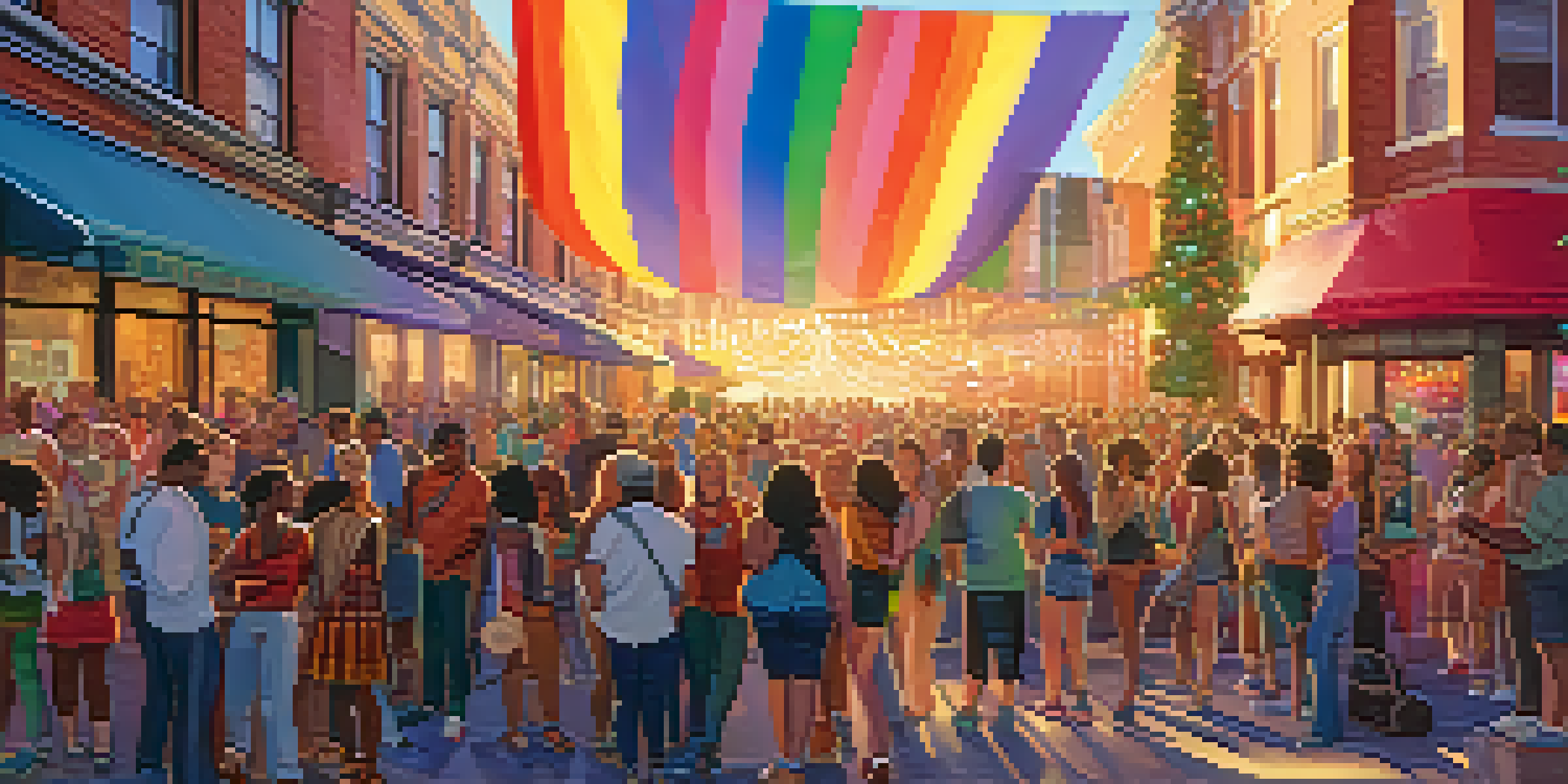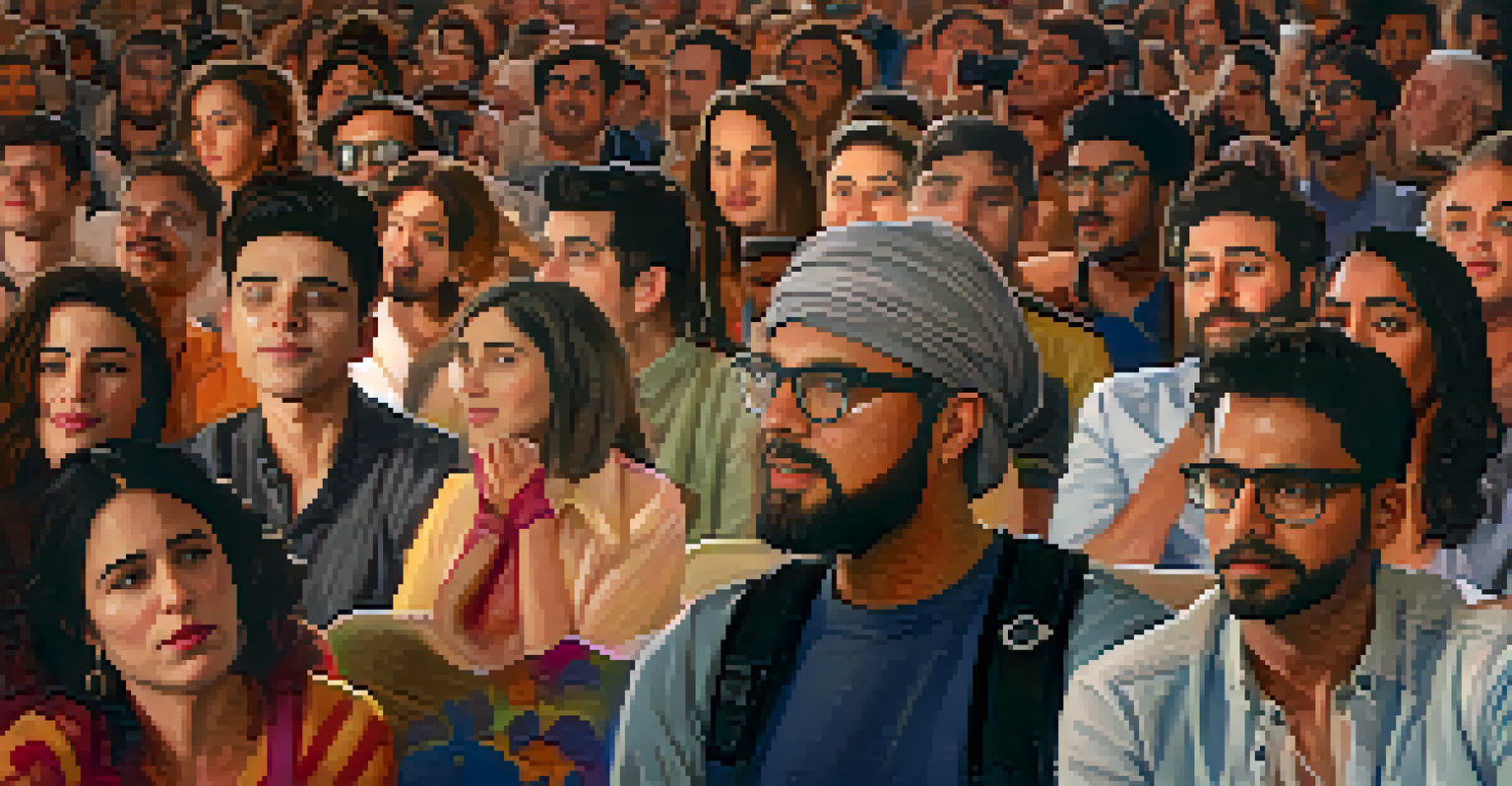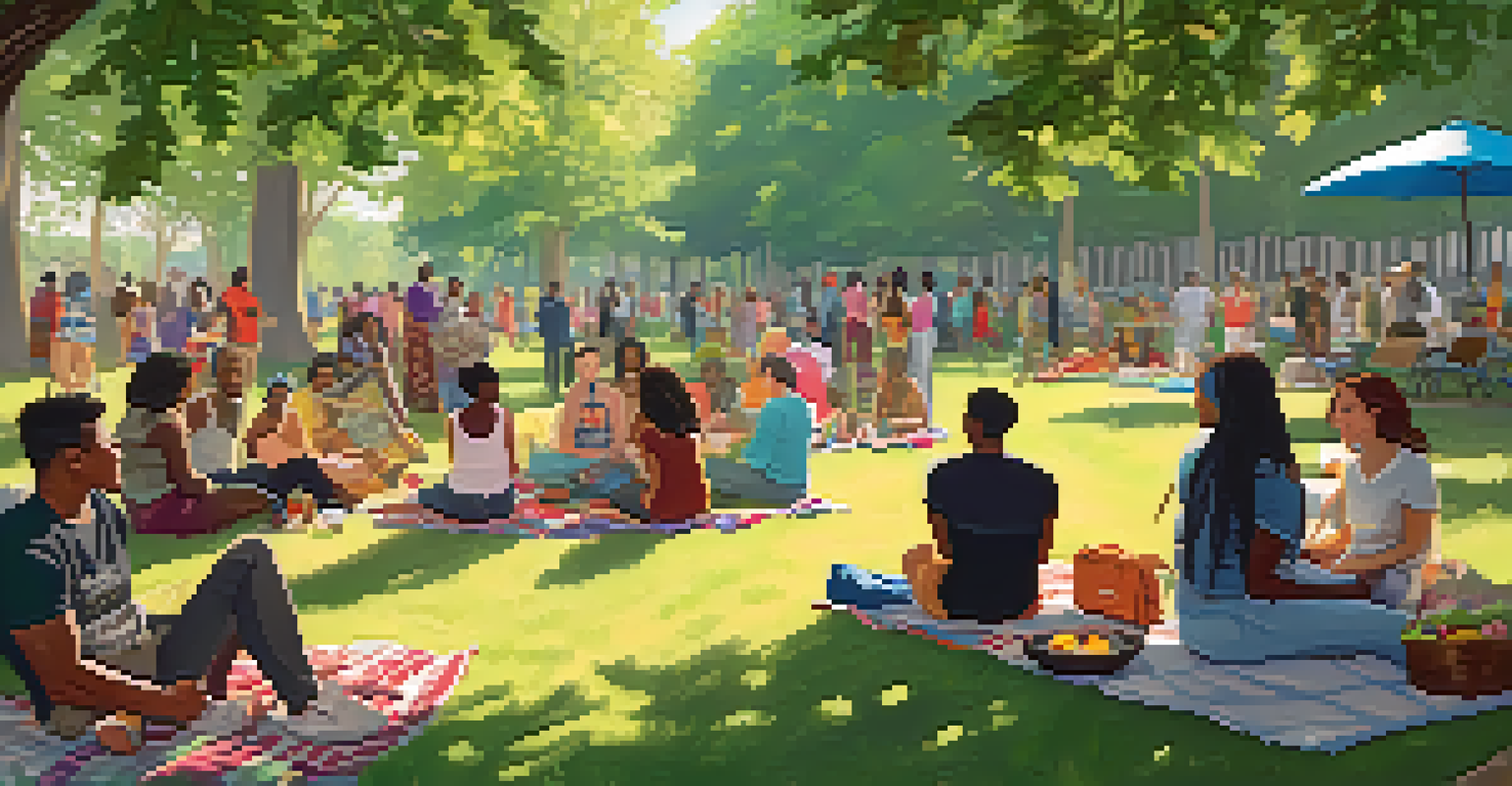The Impact of LGBTQ+ Representation in Hollywood Cinema

Understanding LGBTQ+ Representation in Film
LGBTQ+ representation in film refers to the inclusion of characters and stories that reflect the diversity of sexual orientations and gender identities. It's crucial for audiences to see themselves represented on screen, as it fosters a sense of belonging and community. When films portray LGBTQ+ characters authentically, it challenges stereotypes and promotes understanding.
The importance of authentic representation cannot be overstated, as it helps break down barriers and promotes inclusivity.
Historical context shows that LGBTQ+ characters were often relegated to negative or stereotypical roles, which perpetuated harmful narratives. However, as societal attitudes evolve, so does the portrayal of LGBTQ+ characters. Today, films are beginning to present more complex and relatable LGBTQ+ experiences, contributing to a richer tapestry of storytelling in Hollywood.
This shift in representation is not just about visibility; it’s about the power of storytelling in shaping perceptions. When diverse narratives are told, they can influence public opinion and foster acceptance. The importance of authentic representation cannot be overstated, as it helps break down barriers and promotes inclusivity.
The Historical Journey of LGBTQ+ Characters in Cinema
The journey of LGBTQ+ representation in cinema has been long and fraught with challenges. Initially, films often depicted LGBTQ+ characters in a negative light, reflecting societal prejudices of the time. For instance, early films frequently portrayed gay characters as villains or tragic figures, reinforcing harmful stereotypes.

As the decades progressed, the LGBTQ+ community began to fight for more authentic representation. The 1970s and 80s saw the emergence of more nuanced portrayals, often driven by the activism within the community. Films like 'The Killing of Sister George' and 'Paris Is Burning' began to highlight diverse experiences and cultures, paving the way for future storytellers.
LGBTQ+ Representation Enhances Empathy
Authentic portrayals of LGBTQ+ characters foster understanding and challenge stereotypes, leading to a more inclusive society.
Today, we see a wider range of LGBTQ+ stories being told, from romantic comedies to gripping dramas. This evolution marks a significant shift in Hollywood, as filmmakers strive to create narratives that resonate with a broader audience. The journey continues, but the progress made thus far is a testament to the power of representation.
The Role of Film Festivals in Promoting LGBTQ+ Cinema
Film festivals play a crucial role in promoting LGBTQ+ cinema by providing a platform for diverse voices. Events like the Tribeca Film Festival and Outfest showcase films that might otherwise go unnoticed in mainstream cinema. These festivals not only highlight LGBTQ+ stories but also celebrate the filmmakers behind them.
When audiences see relatable LGBTQ+ characters, it humanizes the experiences of these individuals, fostering empathy and understanding.
By creating a space for LGBTQ+ filmmakers, these festivals foster a sense of community and encourage collaboration. They often feature panels and discussions that educate audiences about the importance of representation in film. This engagement helps cultivate an informed viewer base that appreciates the nuances of LGBTQ+ narratives.
Moreover, the visibility gained at these festivals can lead to greater distribution opportunities for LGBTQ+ films. As these films reach wider audiences, they challenge prevailing stereotypes and promote understanding. The impact of such festivals extends beyond the screen, influencing broader conversations about acceptance and representation in society.
Positive Impacts of LGBTQ+ Representation on Society
LGBTQ+ representation in Hollywood can lead to significant positive changes in societal attitudes. When audiences see relatable LGBTQ+ characters, it humanizes the experiences of these individuals, fostering empathy and understanding. This representation can help reduce stigma and prejudice, leading to a more inclusive society.
Additionally, positive portrayals of LGBTQ+ individuals can inspire acceptance within families and communities. When people see their loved ones represented in a positive light, it can encourage open conversations about sexual orientation and gender identity. This dialogue is essential for breaking down barriers and promoting acceptance.
Film Festivals Boost LGBTQ+ Voices
Events like Outfest provide vital platforms for LGBTQ+ filmmakers, promoting diverse narratives that might otherwise be overlooked.
Furthermore, representation in film can empower LGBTQ+ individuals to embrace their identities. Seeing characters who reflect their experiences can provide validation and support. This empowerment can lead to greater mental health and well-being within the community, highlighting the profound impact that representation can have.
Challenges Still Facing LGBTQ+ Representation in Film
Despite the progress made, challenges remain in achieving authentic LGBTQ+ representation in film. One major issue is the tendency for non-LGBTQ+ actors to portray LGBTQ+ characters. This practice, often referred to as 'straight-washing,' can undermine the authenticity of the portrayal and alienate the community.
Moreover, there is still a lack of diversity within LGBTQ+ representation itself. While we may see more gay characters on screen, other identities, such as transgender and non-binary individuals, still struggle for visibility. This lack of representation can perpetuate the marginalization of these communities within the broader LGBTQ+ narrative.
Additionally, Hollywood often favors stories that fit within a specific mold, leading to formulaic narratives that don’t reflect the richness of LGBTQ+ experiences. This can result in a narrow understanding of what it means to be LGBTQ+, limiting the potential for growth and understanding in storytelling. Addressing these challenges is essential for creating a more inclusive cinematic landscape.
The Future of LGBTQ+ Representation in Hollywood
The future of LGBTQ+ representation in Hollywood looks promising, with an increasing number of filmmakers advocating for diverse narratives. As audiences demand more authentic stories, studios are beginning to recognize the value of including LGBTQ+ perspectives. This shift signals a positive trend toward inclusivity in storytelling.
Emerging platforms, such as streaming services, have also become crucial in promoting LGBTQ+ narratives. These platforms often take risks on underrepresented stories, allowing for a wider range of voices to be heard. This democratization of content creation is paving the way for innovative and diverse storytelling in the industry.
Challenges in Authentic Representation
Despite progress, issues like 'straight-washing' and limited diversity within LGBTQ+ representation continue to hinder true inclusivity in film.
Ultimately, the continued push for representation will rely on both creators and audiences. By supporting LGBTQ+ films and advocating for more diverse stories, we can help shape the future of Hollywood. The ongoing dialogue about representation will ensure that LGBTQ+ voices remain a vital part of the cinematic landscape.
Conclusion: The Importance of Representation in Cinema
In conclusion, LGBTQ+ representation in Hollywood is not just about visibility; it is about the power of storytelling to influence society. Authentic portrayals can foster empathy, challenge stereotypes, and promote understanding. As we continue to see more diverse narratives, we move closer to a more inclusive cinematic landscape.
The journey toward equitable representation is ongoing, with both challenges and triumphs along the way. Film festivals, audience support, and the commitment of filmmakers will play pivotal roles in this evolution. By advocating for diverse voices, we can contribute to a cultural shift that values every individual's story.

Ultimately, the impact of LGBTQ+ representation in Hollywood extends beyond the screen. It has the potential to shape societal attitudes, inspire acceptance, and empower individuals within the community. As we celebrate progress, let’s continue to push for authentic representation that reflects the richness of our shared human experience.